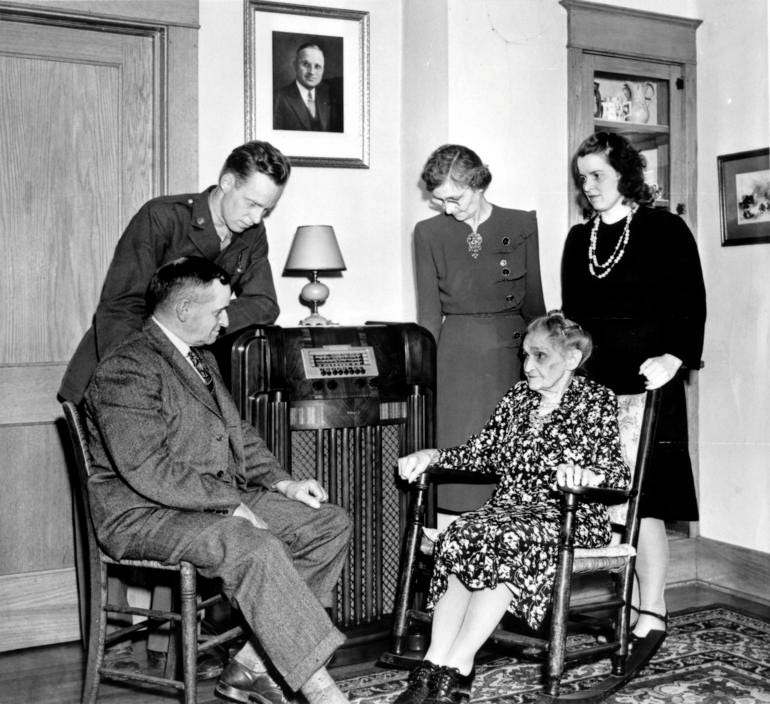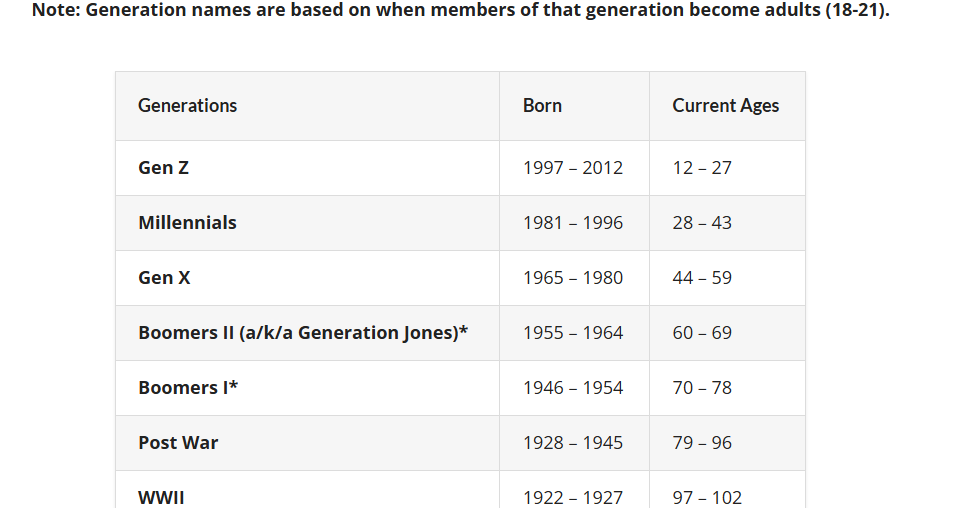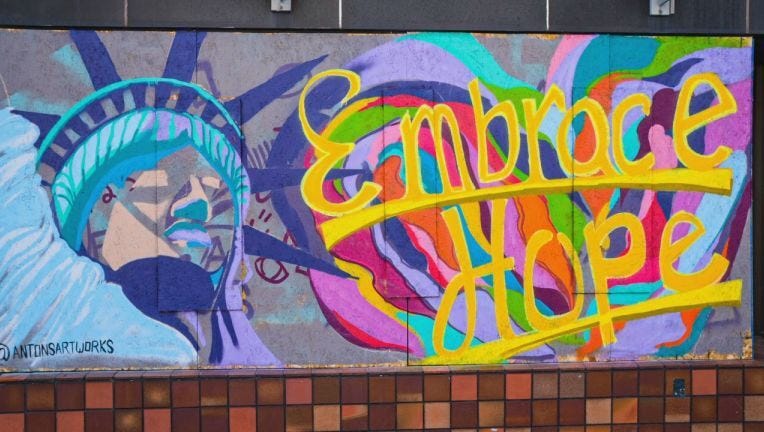Each Generation Needs the One That Comes Next. And the Ones That Came Before.
If we've lived it we have a stake in it.

It doesn’t get past me that I’ve lived so long now I’m in that generation that is dying off. The ‘Silent Generation’. “The Greatest Generation” came before us and they’re almost gone now. They were adults or were coming into adulthood when World War II changed everything. Our youth faced the prospect of war and the rest of the country faced domestic upheaval as we outfitted our factories for war instead of commerce, set up rationing, limited goods and services, turning everything possible into war resources. They took up the call and their sacrifices are what they’re known for today.
My generation came after them. We were the kids made to feel we were helping the war effort (crushing cans, tying up newspapers, buying Liberty Stamps and Bonds at school) while our parents and family members did everything they were told to do to fight it, including giving up both luxuries and necessities. And when the war was over, our families were the ones who benefited from the new prosperity, from the easing of fear, from the general relaxing that became the midcentury years.
Where I lived, in Michigan, the unions became stronger, wages grew higher, and an all-around pride and confidence grew among factory workers. Generations took pride in coming of age to follow in their parents’ footsteps joining that workforce, wearing company and union logos, driving only the make of cars they built, saluting each other as if they were members of a club, a good one doing good things for the country. (But still wary, their union leaders taking on the corporations always ready to hold them back for profit’s sake. They weren’t stupid.)
In his most recent article, Bye, Bye Boomers, David Rothkopf looks at the generational shift taking place right now. It’ll be discussed throughout this election cycle because, of everything else happening since Joe Biden turned over the reigns to his Vice President, Kamala Harris, it may be the most consequential.
It changes the dynamics in ways we can’t yet imagine.
He says:
Notably, the change from Biden to Harris is in fact, one of the most important generational shifts in U.S. politics to occur in decades. The last comparable such shift occurred in 1992. That year, the Democratic Party nominated its first Baby Boomer president. Bill Clinton was born in 1946, in the first wave of the post-War generation in the U.S. His predecessor, George H.W. Bush had served in World War II with distinction as a Naval aviator. He was a member of the so-called Greatest Generation. Reagan served during WWII. Carter entered the Naval Academy during WWII. Ford served in the Navy during the Second World War as did Nixon, Johnson and Kennedy. (It is interesting that for three decades, from the sixties to the early nineties, every president had served in the Navy except Reagan whose tour of duty was in Army.)
Although Eisenhower was Supreme Allied Commander during World War II, he was of the prior generation, the one whose careers had been initially shaped by the First World War.
When Clinton was nominated and then chose as his running mate, Al Gore, born two years after him, it sent a message of youth and change that energized the electorate.
Hardly anyone talks about my generation, the Silent Generation. It’s as if we were so comfortable, so complacent, we barely made a blip on the radar. In a Brittanica article about the Silent Generation I was surprised that the name was actually coined in the Fifties. I thought it was far more recent than that.
“Even more frequently cited is a Time essay from November 1951, “The Younger Generation,” which popularized the term “Silent Generation”:
Youth today is waiting for the hand of fate to fall on its shoulders, meanwhile working fairly hard and saying almost nothing. The most startling fact about the younger generation is its silence. With some rare exceptions, youth is nowhere near the rostrum. By comparison with the Flaming Youth of their fathers & mothers, today’s younger generation is a still, small flame. It does not issue manifestoes, make speeches or carry posters. It has been called the “Silent Generation.”…Almost of itself, it has picked up the right instincts from an American tradition older than its parents: it wants to marry, have children, found homes, and if necessary, defend them.
Below is the current understanding of the generational divides:
From Beresford Research:
The footnote: *We increasingly break up Boomers into two different cohorts because the span is so large, and the oldest of the generation have different sensibilities than the younger. In the U.S., Generation Jones (Boomers II) are just young enough to have missed being drafted into war.
In my own family, two of my children are Boomers, my youngest daughter and my oldest grandson are Gen X, and the last two grandchildren are Gen Z. I have lived closely with each generation following mine, as well as with those before. I may not understand them well, but I know them. We talk, we argue, we make fun of our ‘distinctions’, and I suppose each generation, because we grow with pride and confidence in ways necessary to navigate our new worlds, thinks we know it all.
I, the ‘silent’ one, try not to smash their ideas with, ‘Well, in my day…”. And I couldn’t, anyway. Where does ‘my day’ start and end? I have lived through all of their generations, not nearly as passively as I did when I was young and newly married (in 1956) and jobs were good and we could buy a house on one salary and I was at home being a housewife and a mother.
I grew as the country grew. I became political at an early age—long before I turned 18. I hated that I couldn’t vote until I was 21—I so wanted to vote for Adai Stevenson—twice. When Harry Truman won in a surprising turn in 1948 I was in a room full of adults, cheering my fool head off, as excited as I’d ever been about anything. Even now, I can conjure that room and me in it; the sweat, the smoke, the light from the console radio as we listened to the results. I was 12 years old.
My first presidential vote was for JFK and those days felt as heady as yesterday felt when later generations got to vote for Barack Obama, and as today feels for the young getting ready to vote for Kamala Harris.
I’m thrilled that the young get to do this now. I hope we who are old can keep from feeling as if it’s everybody’s turn now but ours. As long as I’m here I’ll be a part of this, evolving as needed, just as everyone else.
It’ll be my time as long as I live. It’ll be your time and theirs. Every generation lives in a world far different from the ones before them. We alter our positions and our beliefs based on the effect this new world has on us. We can’t stay static, pretending nothing has changed, and if we do, we deserve to be dismissed for it.
But I submit that most politically active older people who have lived through the decades and have experienced the same upheaval, understand full well how important it is to pass the torch to the new. (I don’t consider MAGA politically active. They’re anomalies.)
The younger generations will live longer into the society they’re creating and working to protect. They have the most at stake. The future is theirs now.
We who are old are here to boost them now. How we do that depends on our own worldviews, but going into this election I hope we can remember what it felt like when we were at our most excited, our most committed, the most secure in our belief that we can win because we’re right—and because we must.
We’ve lost many battles along the way, many of them so unfair they almost broke us (the second Nixon, Carter/Reagan, Gore/Bush, Clinton/Trump), but here we all are, each living generation, back at it, ready to go.
We’ll do this together, all of us. Old, young, political veterans, newbies—because the past has shown us how we gain and what we have to lose.
We’ve worked too hard to ever give up. This is our time. We built this country—all of us—and now we get to show the rest of them how a country working together gets it done.
Note: Word just came that Jimmy Carter, in hospice now and turning 100 in October, told his son, Chip, “I’m only trying to make it to vote for Kamala Harris.” 🥹 The Greatest Generation lives.
Further reading:







Good one! My brother was born in 1950; I was born in early 1953, but I feel little to no connection to the "boomer" category. I grew up in the Civil Rights Era, hearing my educator parents remembering the Depression and WWII, seeing them rejoice with the expansion of rights for Black Americans, and, more recently, watching them worry about the reactionary impulses of the so-called "conservatives." They got really fired up when someone wrote a letter to the local paper denying the Holocaust. That's when my dad joined the school board. They worked a booth at the farmers' days fair to register voters.
They marched and stood in protest of the Iraq war.
Meanwhile, my brother's number came up in the draft, and, if he had passed the physical (he didn't), he would have moved to Canada. His life was not easy, but he did pay attention to the political winds and pegged the great conspiracies of the far right way before anyone else in my acquaintance. Way before anyone but "crazies" were saying it.
I'm thrilled we have the option of voting for someone like Kamala Harris and whoever her VP choice is!! I sure hope she wins!
I think about this generation to generation stuff a lot. A lot.
My grandmother, of blessed memory, was part of the Greatest Generation. My mother must be about your age--part of the Silent Generation. I am solidly Generation Jones. My kids are Millennials. Their kids are Gen Z and Gen Alpha. There is a picture of all of five of the generations--it didn't last long; my grandmother died at almost 98, about eight months after my granddaughter was born. That sense of awe of being a grandmother with a grandmother was an amazing feeling.
More than that is the connections from generation to generation, each respecting and learning from the other. And sharing.
One of my favorite memories is of my trumpet-playing daughter playing one of Duke Ellington's songs, then listening as my grandmother told her about dancing to his band with my grandfather just after they were married.
The vertical dimension of generation is only one connection, of course. My family has that East European Jewish immigrant experience; my daughter works with immigrants today. She looks at our family's responses to the world and sees the commonality between the immigrant experiences.
Anyway--thank you for this. It was a wonderful way to start my morning and to contemplate these important connections. (And, yes, I agree about the political dimension as well!)